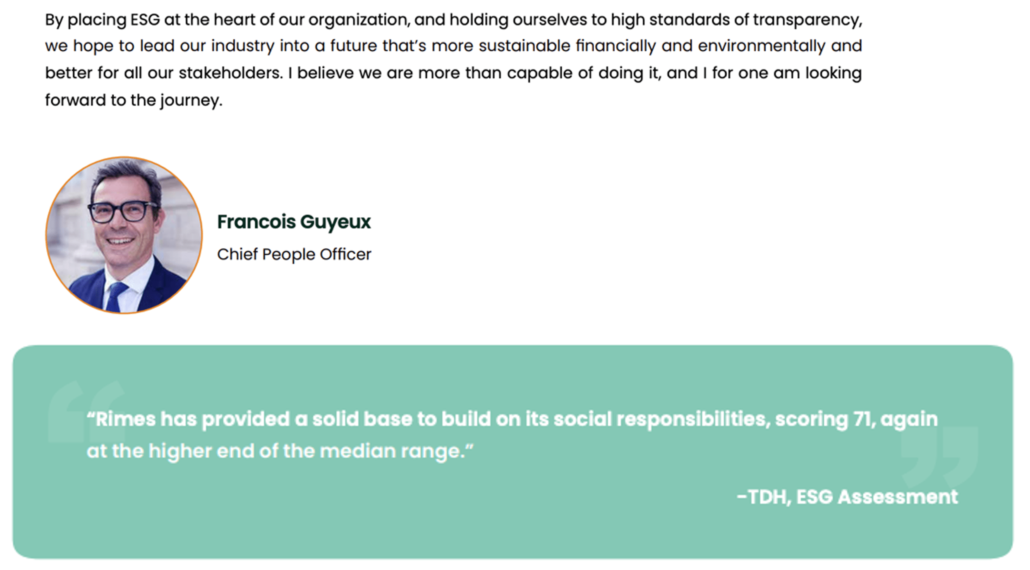Sparking sustainable success
At a glance
Here’s what every business leader needs to know:
What is ESG?
Sitting under the overarching ‘sustainability’ umbrella, ESG specifically refers to the 3 key pillars of Environment, Social and Governance. (We’ll go into more detail on what each of these covers below.)
ESG is a framework and set of standards for assessing and benchmarking an organisation’s business practices and performance around key sustainability, resiliency and ethical issues.
It is used to review and score a company’s performance against a number of different criteria and areas covered within each of the 3 key pillars.

Why does it matter?
Potential investment and supply chain partners want to see sustainability baked into every company they consider doing business with.
Closely aligned to ESG (and also affected by concerns over global supply chain strength) is the concept of business resiliency. This is a now key focus for regulators in the UK, EU and US.
With clarity over your current ESG position and confidence about how to make positive changes to improve sustainability and broader business performance, you can demonstrate responsible management of your values and strategies – and position your business for long-term success.

There’s no going back
Understanding and incorporating ESG into a business strategy is no longer an option. For most companies, it’s now part of doing business – whether it’s a mandatory or discretionary decision.
You need to be prepared
ESG (or sustainability) is being written into law across the globe as part of a compliance and due diligence function. Currently applying to large publicly listed corporations it will become mandatory reporting for many SMEs as regulation and supply chain requirements trickle down to smaller businesses over the coming 3-4 years.
It’s not just an admin chore
Business is recognising that ESG is about more than just words. If applied systematically and championed from the top, it can improve performance and provide competitive advantages everywhere.
Introducing the 3 core pillars
Environment
The Environment pillar is a key component of an effective ESG strategy. A company’s overall approach to energy consumption, waste and water management, and supply chain risk can make a significant difference to its long-term costs, value proposition and attractiveness to counterparties. However, this pillar is typically also the most difficult to navigate, particularly in terms of costs and benefits to the company and in quantifying the measurable benefits it has for stakeholders, especially where resources may be limited.

Social
The Social pillar carries greater significance in the way we do business today. A model that supports prosperity, while consciously promoting the social values of diversity, engagement, inclusion and community, will enable you to implement improvements in workforce productivity and job satisfaction, as well as helping you protect the business from the rising number of controversies associated with poor social judgement.

Governance
Good business governance builds trust and ensures that core values are adopted throughout the company. It helps to promote the right ethical and cultural standards across your business, and protects your workforce, your operations and the interests of all your internal and external stakeholders.

Key reasons why you should think differently about ESG
ESG is a scalable guide to better decision-making
ESG is about creating a blueprint for good business practice – with an unquestionable benefit to performance over the long term.
In SMEs around the world, millions of cumulative work hours are being dedicated to help improve your performance and meet the new paradigm of conducting better business, making/saving money, looking after people and saving the planet.
ESG gives you an instant trouble-shooting check-list
We’re all human – businesses make poor decisions and perform badly. Why would you not want to make use of a low-cost way to analyse your mistakes?
Most fundamental business errors can be tracked to the abuse or mis-use of one or more of the 3 core pillars of ESG.
ESG helps you build a strong awareness platform
When you establish an effective ESG strategy, you can consolidate many of the activities that run under its umbrella into a powerful communication tool.
Good ESG can project an attractive message internally – helping you retain and attract the right talent – as well as externally, to demonstrate solid business planning, reliability and community awareness.
Much of what is done within your everyday business functions can be mapped, measured and targeted for improvement and incorporated into a single sustainability report. All of which contributes to a narrative of progression, adaptability and strong values.
ESG levels the business playing field
By its very nature, ESG can help to democratise doing business by equipping any company with the tools that have traditionally been the prerogative of much larger, better funded businesses with dedicated resources.
As knowledge, information and expertise become available to a much bigger cross-section of enterprises – at much lower cost – those who adopt and leverage early can build on the strategies only normally available to deep-pocket business and their armies of ‘big name’ consultants.

Unlock your growth potential
Explore our comprehensive
ESG solutions
Get started today with our quick quiz that assesses where you currently are on ESG, in a light-touch way:
1Starter Quiz – Managed Service
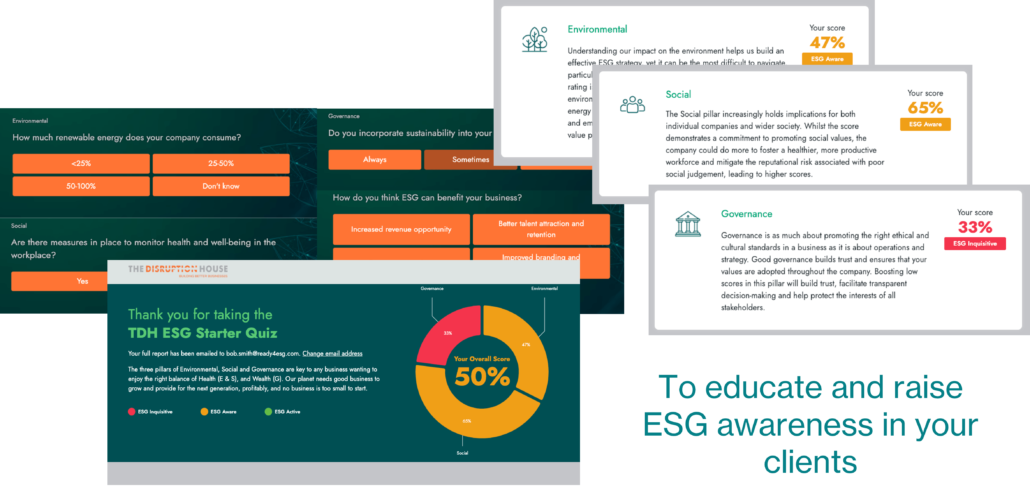
2Performance Scorecard, Benchmark and Certificate
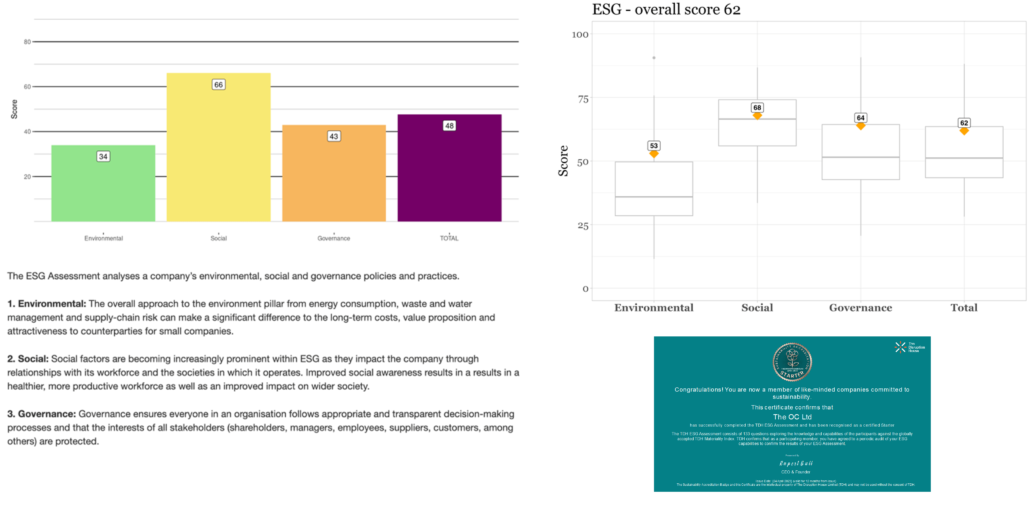
3Carbon Footprint Calculator
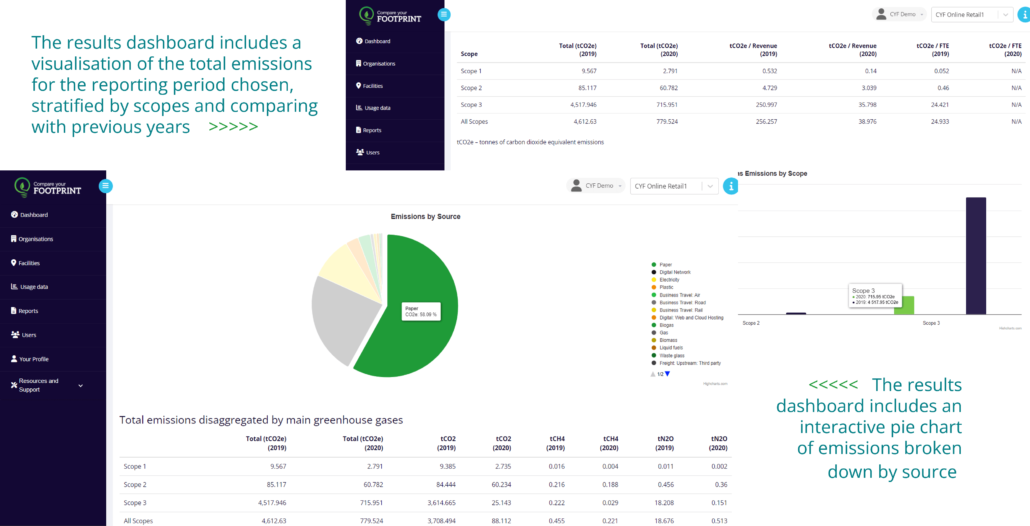
4Employee Surveys
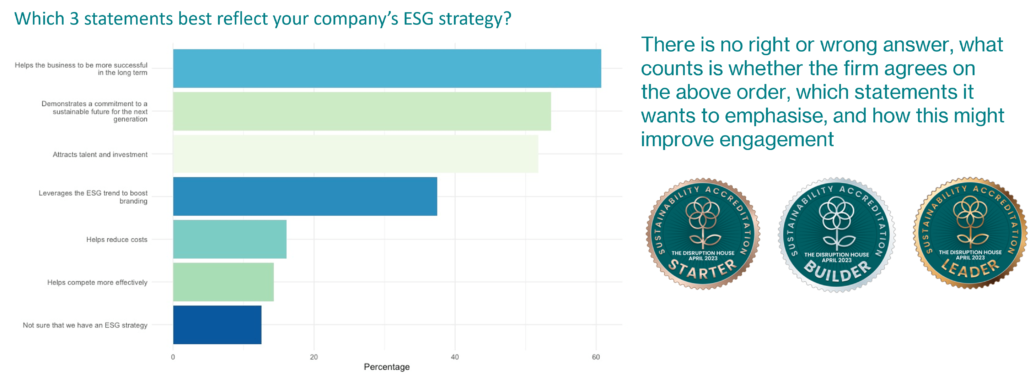
5Insights and Analyst Reports
ClientCo’s ESG score of 62 surpasses its peers, as shown below, reflecting strong ESG actions and planning. Their standout strengths lie in Sustainability, ESG Policies, and both Environment and Governance pillars. Despite companies of similar maturity usually scoring lower in Environment, ClientCo’s score of 53 is notable. By prioritizing emissions reduction, they can further excel in Sustainability.
|

  |
6Sustainability Statements and Reports
A Sustainability Report that has been validated by TDH removes risk of Greenwashing and increases stakeholder engagement.
| 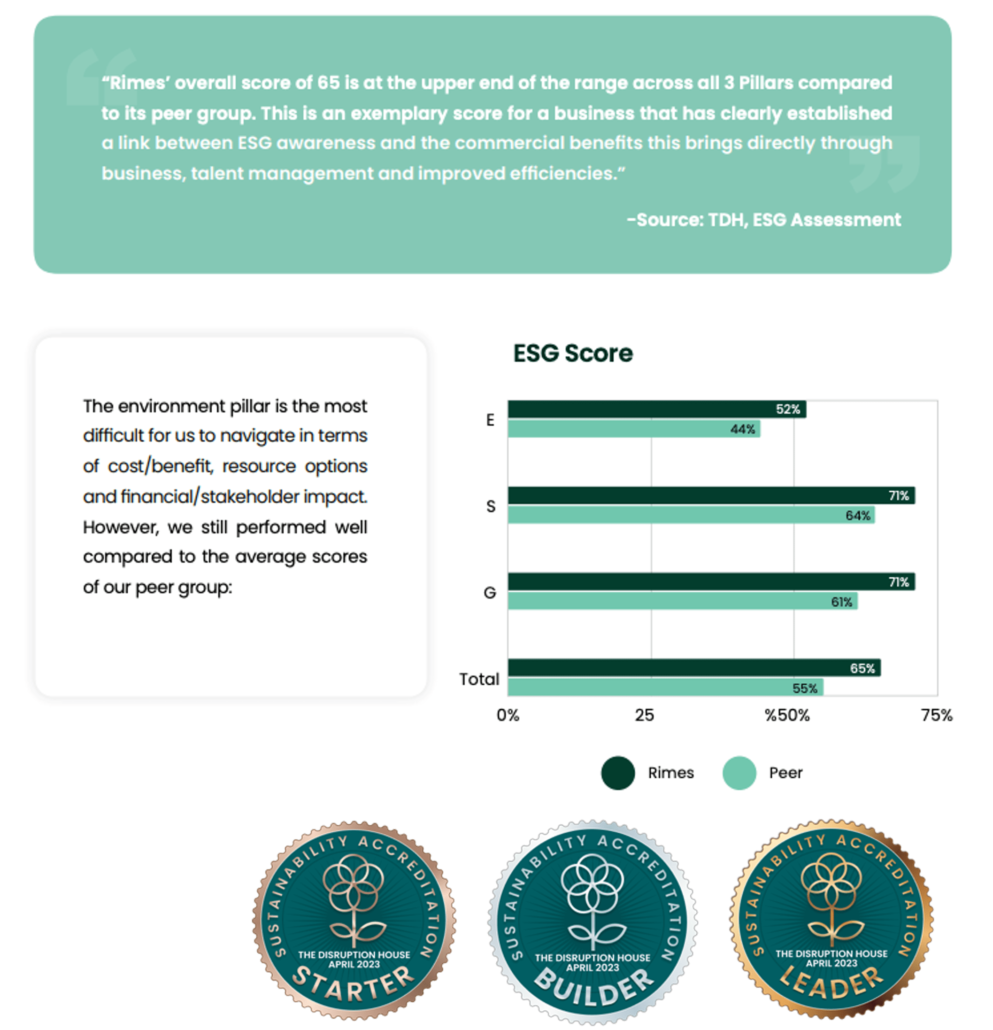 |

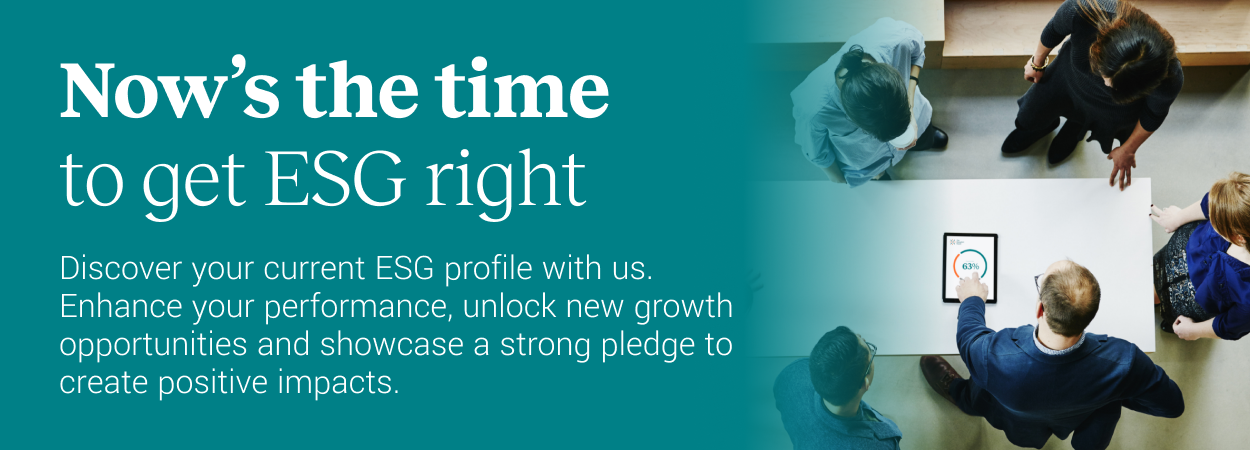
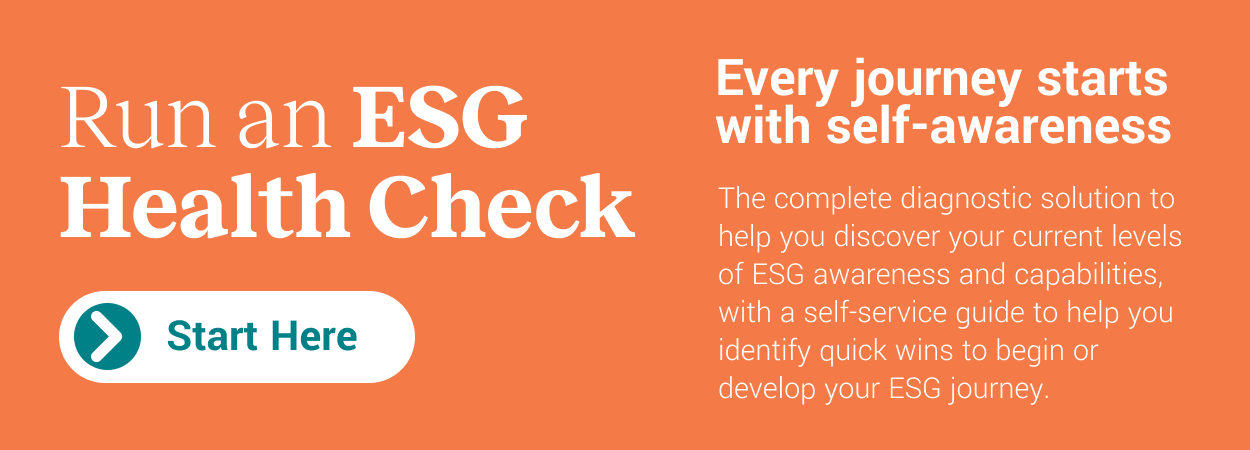
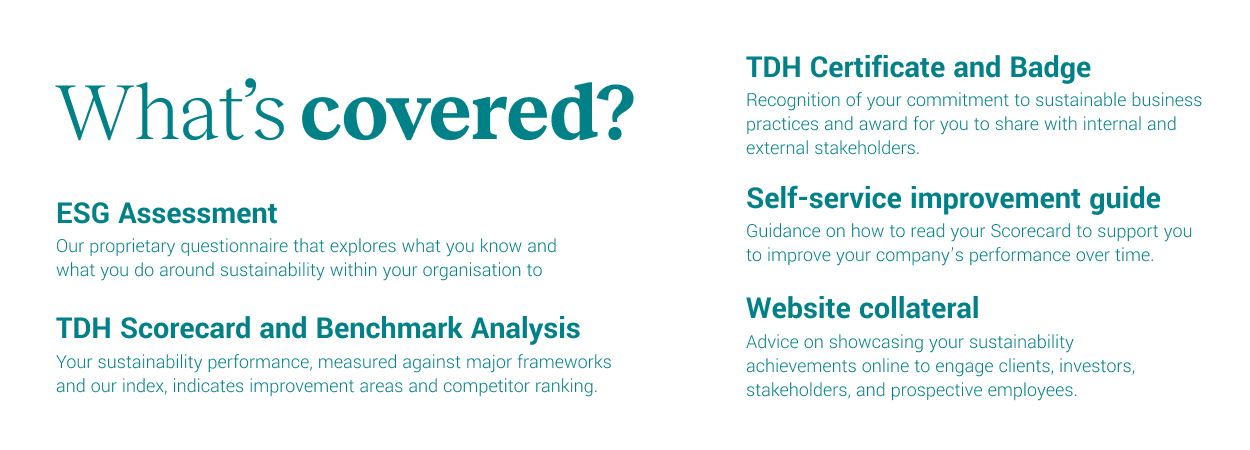

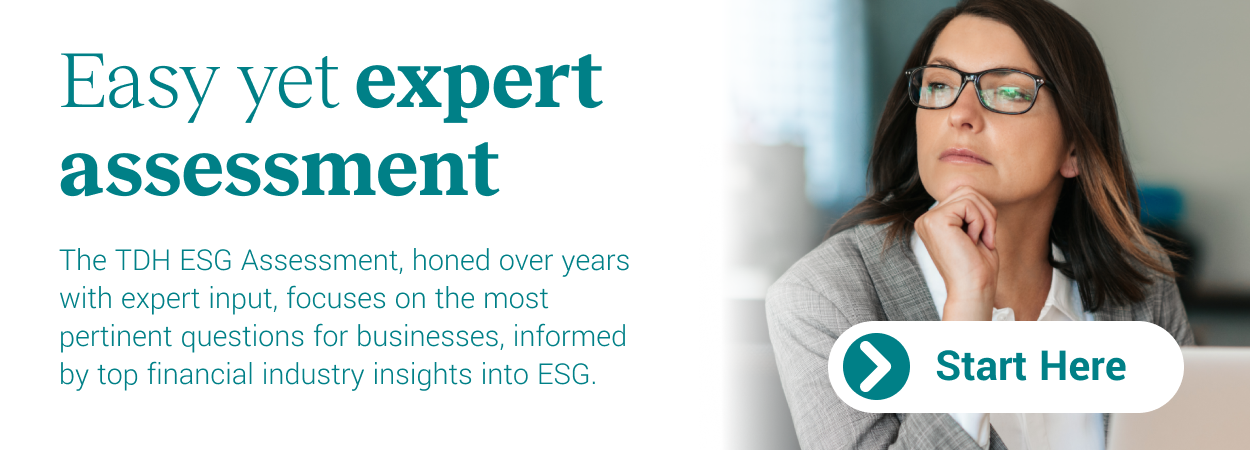
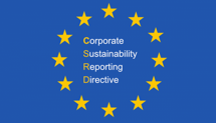 Insight reports are mapped to EU supply chain disclosure regulations:
Insight reports are mapped to EU supply chain disclosure regulations: